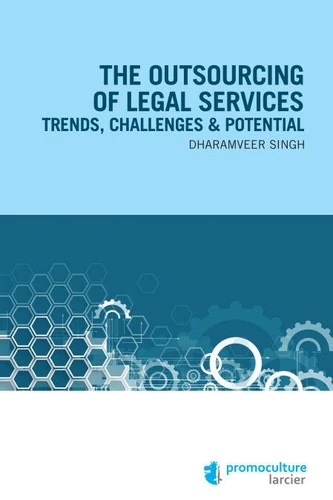The outsourcing of legal services. Trends, challenges & potential
Par :Formats :
Disponible dans votre compte client Decitre ou Furet du Nord dès validation de votre commande. Le format ePub est :
- Compatible avec une lecture sur My Vivlio (smartphone, tablette, ordinateur)
- Compatible avec une lecture sur liseuses Vivlio
- Pour les liseuses autres que Vivlio, vous devez utiliser le logiciel Adobe Digital Edition. Non compatible avec la lecture sur les liseuses Kindle, Remarkable et Sony
 , qui est-ce ?
, qui est-ce ?Notre partenaire de plateforme de lecture numérique où vous retrouverez l'ensemble de vos ebooks gratuitement
Pour en savoir plus sur nos ebooks, consultez notre aide en ligne ici
- FormatePub
- ISBN978-2-87974-848-1
- EAN9782879748481
- Date de parution27/10/2015
- Protection num.pas de protection
- Infos supplémentairesepub
- ÉditeurÉditions Larcier
Résumé
Economic globalization is transforming practically every service sector. The legal industry that has long remained insulated too has not remained untouched by the effects of globalization. The outsourcing of legal services in the past one decade has transformed the legal landscape. Legal outsourcing to India is becoming increasingly popular among U. S. and European law firms and corporations. This book broadly seeks to discuss three main topics surrounding legal process outsourcing (LPO): its emerging trends, the legal challenges it raises and the hitherto unrecognized potential it holds.
Firstly, this book clarifies concepts of LPO and its operating models practiced by U. S. and U. K. law firms and corporations. Secondly, the outsourcing of legal services creates significant challenges for ethics rules including conflict of interests, attorney-client privilege, supervision and fee sharing. Thirdly, this research explores the hidden potential of LPO to improve access to justice. This book develops an altogether new proposal where Indian LPO professionals could help alleviate the access to justice problem among indigent and low-income populations of the United States.
Firstly, this book clarifies concepts of LPO and its operating models practiced by U. S. and U. K. law firms and corporations. Secondly, the outsourcing of legal services creates significant challenges for ethics rules including conflict of interests, attorney-client privilege, supervision and fee sharing. Thirdly, this research explores the hidden potential of LPO to improve access to justice. This book develops an altogether new proposal where Indian LPO professionals could help alleviate the access to justice problem among indigent and low-income populations of the United States.
Economic globalization is transforming practically every service sector. The legal industry that has long remained insulated too has not remained untouched by the effects of globalization. The outsourcing of legal services in the past one decade has transformed the legal landscape. Legal outsourcing to India is becoming increasingly popular among U. S. and European law firms and corporations. This book broadly seeks to discuss three main topics surrounding legal process outsourcing (LPO): its emerging trends, the legal challenges it raises and the hitherto unrecognized potential it holds.
Firstly, this book clarifies concepts of LPO and its operating models practiced by U. S. and U. K. law firms and corporations. Secondly, the outsourcing of legal services creates significant challenges for ethics rules including conflict of interests, attorney-client privilege, supervision and fee sharing. Thirdly, this research explores the hidden potential of LPO to improve access to justice. This book develops an altogether new proposal where Indian LPO professionals could help alleviate the access to justice problem among indigent and low-income populations of the United States.
Firstly, this book clarifies concepts of LPO and its operating models practiced by U. S. and U. K. law firms and corporations. Secondly, the outsourcing of legal services creates significant challenges for ethics rules including conflict of interests, attorney-client privilege, supervision and fee sharing. Thirdly, this research explores the hidden potential of LPO to improve access to justice. This book develops an altogether new proposal where Indian LPO professionals could help alleviate the access to justice problem among indigent and low-income populations of the United States.



